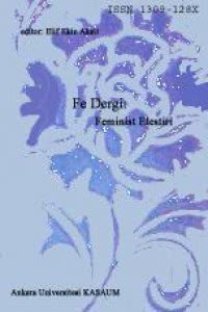Vegan Erkeklerin Beslenme Biçimleri Bağlamında Erkeklik İnşaları
Toplumsal Cinsiyet, Erkeklik, Vegan Erkeklik, Madun Erkeklik, veganizm
Masculinity Construction in the Context of the Dietary Patterns of Vegan Men
Gender, Manhood, Vegan Manhood, Subordinate Masculinity, Veganism,
___
- Adams, Carol J. Etin Cinsel Politikası, çev. Güray Tezcan ve E. Boyacıoğlu, (İstanbul: Ayrıntı Yayınları, 2015).
- Berg, Bruce L. ve Lune, Howard. Sosyal Bilimlerde Nitel Araştırma Yöntemleri. çev. edt. Asım Arı, (Konya: Eğitim Yayınevi, 2015).
- Burgan, Ezgi. “İlk Kültürel Gereç Çuval İse: Erkeklik ve Et Yemenin Kesişimselliğinde Bilimsel Anlatıları Kuruluşu”. Fe Dergi, 7(2), (2015), 35-47. https://doi.org/10.1501/Fe0001_0000000141
- Connell, Raewyn W. Erkeklikler. çev. Nagihan Konukçu, (Ankara: Phoenix, 2019).
- Çarpar, Mehmet Can. “Beslenme, kimlik ve erkeklik: et yemenin sosyolojisi”, İstanbul Üniversitesi Sosyoloji Dergisi, 40(1), (2020), 249-277. https://dergipark.org.tr/tr/pub/iusosyoloji/issue/56274/776517
- Dahlberg, Frances (Ed.). Woman the Gatherer (Revisededition.). (New Haven London: Yale University Press, New Haven London, 2009).
- Dökmen, Zehra Y. “BEM Cinsiyet Rolü Envanteri Kadınsılık ve Erkeksilik Ölçekleri Türkçe Formunun Psikometrik Özellikleri”, Kriz Dergisi, 7(1), (1999), 27-40. https://dergipark.org.tr/tr/download/article-file/595862
- Elgün, Aslı. “Dijital kültürde erkeklik(ler): Instagram #erkeklik üzerine bir içerik”, Turkish Studies, 15(2), (2020), 911-941. https://dx.doi.org/10.29228/TurkishStudies.41639
- Fisher, Elizabeth. Woman’s Creation: Sexual Evolution and the Shaping of Society. (Norwell: Anchor Press, 1979).
- Franklin, Adrian. Animals and Modern Cultures: A Sociology of Human-Animal Relations in Modernity. (SAGE Publications Ltd, 1999). http://dx.doi.org/10.4135/9781446217764
- Fusch, Patricia I. ve Ness, Lawrence R. “Are we there yet? Data saturation in qualitative research.” The Qualitative Report, 20(9), (2015), 1408-1416. https://doi.org/10.46743/2160-3715/2015.2281
- Gelderloos, Peter. “Veganism: why not-an an archist perspective.” (2011). https://theanarchistlibrary.org/library/peter-gelderloosveganism-why-not (erişim tarihi: 2.10.2021)
- Gorely, Trish; Holroyd, Rachel ve Kirk, David. “Muscularity, the habitus and the social construction of gender: towards a gender-relevant physical education.” British Journal of Sociology Education, 24(4), 429-447. https://doi.org/10.1080/01425690301923
- Hooley, Dan ve Nobis, Nathan. “The human society institute for science and policy animal studies repository”. Animal Agriculture, Food Choice and Human Healty 6, (2016).
- Kaçar Bozkurt, Gamze. Vegan diyeti. (İstanbul: Urzeni Yayıncılık, 2019).
- Kelly, Robert L. The Foraging Spectrum: Diversity in Hunter-Gatherer Lifeways. (Clinton Corners, New York: Percheron Press/Eliot Werner Publications, 2007).
- Kümbetoğlu, Belkıs. Sosyolojide ve Antropolojide Niteliksel Yöntem ve Araştırma. (İstanbul: BağlamYayıncılık, 2019).
- Larsson, L. Christel; Rönnlund, Ulla; Johansson, Gunnar ve Dahlgren, Lars. “Veganism as Status Passage: The Process of Becoming a Vegan among Youths in Sweden.” Appetite, 41(1), (2003). 61-67. https://doi.org/10.1016/s0195-6663(03)00045-x
- Mann, Sarah. E. More than just a diet: An inquiry into veganism. Anthropology Senior Theses. University of Pennsylvania, 156, (2014).
- Messner, Michael A. Boyhood, organized sports, and the construction of masculinities. Edt. M.S. Kimmel ve M. A. Messner, Men’s Lives. (5th ed.), (Boston: Allynand Bacon, 2001).
- Mies, Maria. Dünya ölçeğinde ataerki ve birikim: uluslar arası işbölümünde kadınlar. çev. Yıldız Temurtürkan, (Ankara: Dipnot Yayınları, 2011).
- Russell, Nerissa. Social Zoo archaeology: Humansand Animals in Prehistory. (Cambridge New York: Cambridge University Press, 2012).
- Sancar, Serpil. Erkeklik: imkânsız iktidar: ailede, piyasada ve sokakta erkekler. (İstanbul: Metis Yayınları, 2009).
- Slocum, Sally. “Woman The Gatherer: Male Bias in Anthropology”. Rayna R. Reiter (ed.), Toward an Anthropology of Women. (New York: Monthly Review Press, 1975).
- Stibbe, Arran. “Health and the Social Construction of Masculinity in Men’s Health Magazine”, Men and Masculinities, 7(1), (2004), 31-51. https://doi.org/10.1177/1097184X03257441
- Straight Edge (2020). https://tr.wikipedia.org/wiki/Straight_edge (erişim tarihi: 15.11.2021)
- Şavran Gönç, Temmuz. “Sosyolojide Nicel ve Nitel Araştırma Yöntemleri”. Sosyolojide Araştırma Yöntem ve Teknikleri. ed. Nadir Suğur. (Eskişehir: Anadolu Üniversitesi Yayını, 2009) 78-96.
- The Economist. “Eril Dodo: erkekler gerekli midir?”, Sosyoloji. yay. haz. Anthony Giddens. (Ankara: Say Yayınları, 2009) 135-143.
- Thompson, Edward. H. ve Bennett, Katte M. “Measurement of masculinity ideologies: A (critical) review”, Psychology of Men &Masculinity, 16(2), (2015), 115-133. https://doi.org/10.1037/a0038609
- Twigg, Julia. “Food for thought: Purity and vegetarianism”, Religion, 9(1), (1979), 13-35. https://doi.org/10.1016/0048-721X(79)90051-4
- Vandello, Joseph. A; Bosson, Jeniffer K; Cohen, Dov; Burnaford, Rochelle. M. ve Weaver, Jonathan. R. “Precarious manhood”, Journal of Personality & Social Psychology, 95, (2008), 1325-1339. https://doi.org/10.1037/a0012453
- Yıldırım, Ali ve Şimşek, Hasan. Sosyal Bilimlerde Nitel Araştırma Yöntemleri. (6. Baskı). (Ankara: Seçkin Yayıncılık, 2008).
- ISSN: 1309-128X
- Yayın Aralığı: 2
- Başlangıç: 2008
- Yayıncı: Ankara Üniversitesi KASAUM
Yıkılmış Kadın'ı İkinci Cinsiyet ve Müphemlik Etiği Üzerinden Yeniden Okumak
“Yalnız Yürümeyeceksin”: Çevrim İçi Feminist Tanıklık ve Örtünmenin Dönüşen Öznellikleri
Leyla Erbil’in Politik Poetikası Üzerine Bir İnceleme
Ayla ZAMAN, Temmuz GÖNÇ ŞAVRAN
Vegan Erkeklerin Beslenme Biçimleri Bağlamında Erkeklik İnşaları
Sena KAÇAR, İsmail KERVANKIRAN
Çevrimiçi Cinsel Taciz Ölçeği’nin Türkçe’ye Uyarlanması: Geçerlik ve Güvenirlik Çalışması
Erol ESEN, Barışcan ÖZTÜRK, Adil KAVAL
“Sen de mi rahibe olacaksın?”: Sahanın Yansıması
Kadınların Modernleşme Deneyimlerinden Fragmanlar: Eski Bir İşletme Kasabası Değirmisaz
